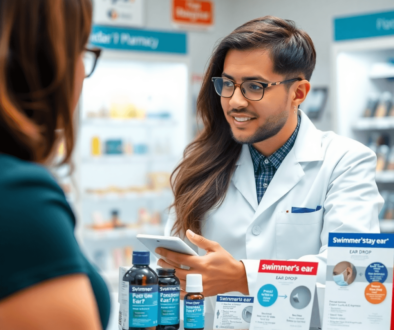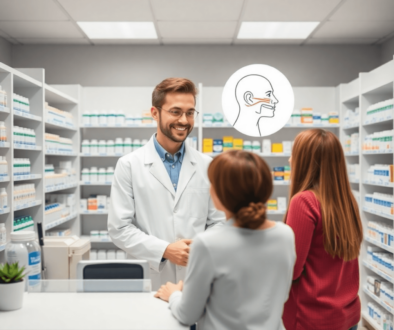Top Questions to Ask Your Pharmacist Before Starting a New Medication
Starting a new medication? Better chat with your pharmacist first!
Pharmacists are your medication safety superheroes.
Discover the top questions to empower your treatment decisions.
1. Ensuring Compatibility with Current Medications
Keywords: Drug Interactions, Medication Compatibility
Understanding the importance of checking for potential drug interactions before starting a new medication is crucial to ensure your safety and treatment efficacy.
When consulting your pharmacist about a new medication, make sure to provide a comprehensive list of all current medications you are taking. This includes prescription drugs, over-the-counter medications, vitamins, supplements, and herbal remedies.
By sharing this information with your pharmacist, they can conduct a thorough evaluation to assess the compatibility of the new medication with your current regimen. This step helps prevent harmful interactions and ensures that each medication works optimally without compromising your health. Always remember, transparency about your current medications is key to a successful treatment plan.
2. Exploring Interactions with Vitamins and Supplements
Prescription drugs don’t work alone. They can interact with vitamins, supplements, and herbal remedies you’re already taking, sometimes changing how the medication works or increasing side effects.
Think about it this way: your daily multivitamin might be harmless on its own, but when combined with certain drugs, it could cause unexpected reactions. For example:
- St. John’s Wort, a popular herbal remedy for mood, can reduce the effectiveness of some antidepressants and birth control pills.
- Calcium supplements might interfere with the absorption of antibiotics like tetracycline.
Your pharmacist needs to know everything you’re taking. That means no “I only take fish oil” half-truths—be upfront about every supplement and herbal remedy. This helps them spot any potential supplement interactions and advise you on how to avoid trouble while getting the most from your new prescription.
3. Considering Cost-Effective Alternatives
When prescribed a new medication, it’s important to have an open conversation with your healthcare provider or pharmacist about the cost of the medication and any potential alternatives. One effective way to save money on prescription drugs is by considering generic medications.
Why Choose Generic Medications?
Generic medications are copies of brand-name drugs that have the same active ingredients, dosage form, and strength. They are required by law to meet the same quality and safety standards as their brand-name counterparts. Here are some reasons why you should consider generic medications:
- Cost Savings: Generic medications are typically much cheaper than brand-name drugs, often costing 30% to 80% less. This can result in significant savings for patients, especially those who require long-term or multiple prescriptions.
- Same Quality and Efficacy: Generic medications undergo rigorous testing to ensure they are bioequivalent to the brand-name drug. This means they work in the same way and provide the same therapeutic benefits.
- Accessibility: Generic medications are more widely available than brand-name drugs. If a specific brand is not covered by your insurance or is difficult to obtain, there may be a generic alternative that is readily accessible.
Questions to Ask Your Pharmacist
Before starting a new medication, here are some important questions to ask your pharmacist:
- Is there a generic version of this medication available?
- How does the generic version compare to the brand-name drug in terms of effectiveness and side effects?
- Will my insurance cover the cost of the generic medication?
- Are there any specific storage requirements for the generic medication?
- Can you provide any additional information about potential drug interactions or contraindications?
By asking these questions, you can make informed decisions about your medication options and potentially save money on your prescriptions.
Remember, it’s always best to consult with your healthcare provider before making any changes to your medication regimen. They can provide personalized advice based on your specific health needs and conditions.
4. Managing Missed Doses Effectively
Missing a dose of medication can happen to anyone. It’s important to know how to handle missed doses to ensure you stay on track with your treatment plan. Here are some guidelines to follow:
When to Take the Missed Dose
If you remember that you missed a dose and it’s still relatively close to the time when you usually take it, go ahead and take the missed dose as soon as you remember. This is especially true for medications that need to be taken at specific intervals or those that require a certain level of consistency in your system.
When to Skip the Missed Dose
However, if it’s almost time for your next scheduled dose, it’s best to skip the missed dose altogether. Taking two doses at once can lead to an overdose or increase the risk of side effects. In such cases, just continue with your regular dosing schedule.
Important Note
Always refer to your specific dosage instructions provided by your healthcare professional or pharmacist. Different medications may have different guidelines regarding missed doses, so it’s crucial to follow their advice.
Remember, consistency is key when it comes to medication management. If you find yourself frequently missing doses or struggling with adherence, don’t hesitate to reach out to your healthcare provider for support and guidance. Understanding the reasons behind missed doses can also be helpful in managing this issue more effectively.
5. Understanding Potential Side Effects
Side effects aren’t just medical jargon—they’re real reactions your body might have to a new medication. Knowing what could happen helps you spot trouble early and avoid unnecessary panic. Some side effects are common and mild, like a dry mouth or slight dizziness, while others may be rare but serious.
Before filling that prescription, ask your pharmacist:
- What are the common reactions I should expect?
- Which side effects require immediate medical attention?
- Are there ways to minimize or manage these side effects?
Don’t hesitate to discuss any concerns. If nausea, headaches, or fatigue start crashing your party, your pharmacist can suggest remedies or even alternative treatments. Remember, no question is too small when it comes to your health. Being proactive about side effects means you stay in control, not the other way around.
6. Lifestyle Changes While Taking Medication
Medications don’t work alone. Some drugs can go along with your regular diet and activities, while others require special care. Ignoring dietary restrictions or activity limitations can make your medication less effective—or even worse, lead to unexpected side effects.
This is where your pharmacist becomes your personal lifestyle coach:
- Foods to avoid: Grapefruit juice is a well-known troublemaker, messing with enzymes that break down certain meds. Leafy greens? Great for health but may clash with blood thinners.
- Activity modifications: Some medications can cause drowsiness or dizziness, making driving or operating heavy machinery a bad idea.
- Alcohol consumption: Often off-limits because it can amplify side effects or hinder your drug’s action.
Asking your pharmacist about these Top Questions to Ask Your Pharmacist Before Starting a New Medication ensures you’re not just taking pills without understanding. A quick conversation could save you from expensive mistakes and keep your treatment on track.
7. Proper Storage and Handling Instructions for Medications
Medication storage isn’t just about tossing pills into a cupboard and hoping for the best. Improper storage can cause medications to degrade or become contaminated, turning your life-saving pills into glorified sugar cubes—or worse, harmful substances. Temperature, humidity, and light exposure all play a role in keeping meds effective.
Here’s what you need to know:
- Refrigeration: Some medications like insulin or certain eye drops require a chill zone in your fridge. Leaving them out can reduce their potency or cause spoilage.
- Avoiding Light: Drugs such as nitroglycerin need protection from bright light; they often come in amber bottles for this reason.
- Humidity Control: Bathrooms might seem convenient but the steam and moisture can mess with many meds. A dry, cool place is usually best.
- Original Packaging: Keeping medicine in its original container helps maintain its integrity and provides important labels and expiry dates.
Ask your pharmacist for specific storage guidelines tailored to each medication. They’re the experts at making sure your meds stay safe and effective until you need them.
8. Duration of Medication Use and Treatment Completion
When it comes to treatment duration, sticking to the full course of your medication is non-negotiable—even if you start feeling better halfway through. Skipping doses or stopping early can lead to incomplete treatment, allowing the illness to linger or bounce back stronger. Think of it like a movie: don’t walk out before the credits roll, or you’ll miss the ending (and probably confuse yourself).
Pharmacists stress that:
- Completing your prescription helps prevent antibiotic resistance, especially with infections.
- Early discontinuation might mask symptoms but won’t tackle the root cause.
- They can clarify how long you should take your meds and why that timeline matters.
If side effects or concerns crop up, loop your pharmacist in before making any changes. They’ll guide you safely through adjustments without risking treatment failure.
Conclusion
Your pharmacist is more than just the friendly face behind the counter—they’re your go-to expert for safe medication use and personalized advice. Don’t hesitate to turn your visit into a mini Q&A session armed with the top questions to ask your pharmacist before starting a new medication.
- Clarify doubts about interactions
- Explore cost-effective options
- Understand side effects and lifestyle tweaks
Think of it as partnering up for your health—because expert guidance from pharmacists can make all the difference between guesswork and confidence on your treatment journey. Ask away, stay informed, and take control of your meds like a pro.



